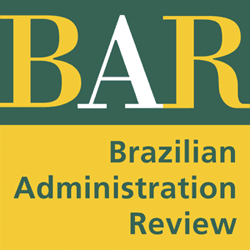Editorial
Up to the third volume, the Brazilian Administration Review was published twice yearly. From this edition onwards, the first of 2007, the year of the fourth volume, it will be published three times a year with an edition for January-April, May-August and September-December.
This change to three times a year has been our idea since the periodical was first launched, obviously linked to the number of submissions of articles of high quality. Therefore, it was only a matter of time as there was never a doubt that it would be a success as the idea was backed by the academic weight of ANPAD (The Brazilian Academy of Management). These steps that were planned for the development of the BAR happening at a pace that is in line with the serious nature of an academic periodical.
In this first four-monthly edition of the BAR, five articles are made available to our readers and collaborators. As was the case in the last edition, two articles were selected from among those submitted via the regular channels and three from among those submitted to the special forum on the Institutional Theory on Brazilian Organizational Studies.
In the first article, André Luiz M. de Souza Leão and Sérgio C. Benício de Mello have used the means-end theory and the laddering method to understand customer values of an important on-line Brazilian newspaper. To follow, Felipe de Faria Monaco and Valeska Nahas Guimarães have studied through the use of qualitative research procedures the implications related to people's creativity expression owing to work organization in small groups in the Ambev S.C. branch.
The three following articles are the continuation of the Special Forum on Institutional Theory on Brazilian Organization Studies, whose first series of articles was published in Number 2 of Volume 3, immediately prior to this edition. In the first of them, Carlos Alberto Freitas and Tomás de Aquino Guimarães seek to verify the nature of the relationship between the concept of legitimacy and the phenomenon of institutionalization of operational auditing at the Brazilian Court of Auditors in a context of institutional isomorphism. Then Marco Aurelio Lima de Queiroz, Flávio Carvalho de Vasconcelos and Rafael Guilherme Burstein Goldszmidt advance that the conceptual framework of the Institutional Theory may offer managers a contribution towards understanding the strategy process and its potentialities, particularly by stressing the leading role played by legitimacy, in the pursuit and acquisition of economic rents. At last but not least, João Marcelo Crubellate in an instigating theoretical essay describes some neofunctionalist concepts (system openness and closeness, double contingency and expectation of expectations) proposed by Niklas Luhmann, discussing their impact on traditional institutional theory dichotomies, in the realm of Luhmannian theory of institutions. Following the line of the previous issue of the special forum, the authors of these three articles seek to concentrate on the perspectives and challenges that we are faced with at this moment of development of the institutional theory, especially in the Brazilian context.
We hope you all find these articles interesting and enjoy this edition.
Clóvis L. Machado-da-Silva
Chief Editor
Publication Dates
-
Publication in this collection
28 Sept 2009 -
Date of issue
Apr 2007

